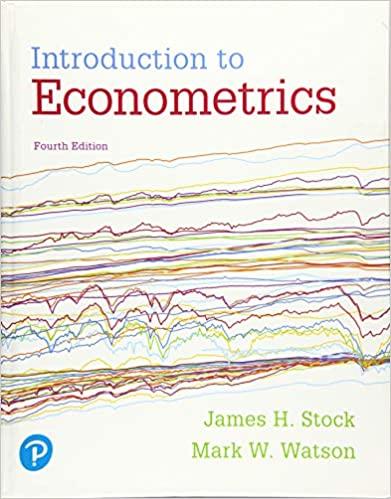Consider the regression model with heterogeneous regression coefficients [ Y_{i}=beta_{0}+beta_{1 i} X_{i}+v_{i} ] where (left(v_{i}, X_{i}, beta_{1
Question:
Consider the regression model with heterogeneous regression coefficients
\[ Y_{i}=\beta_{0}+\beta_{1 i} X_{i}+v_{i} \]
where \(\left(v_{i}, X_{i}, \beta_{1 i}\right)\) are i.i.d. random variables with \(\beta_{1}=E\left(\beta_{1 i}\right)\).
a. Show that the model can be written as \(Y_{i}=\beta_{0}+\beta_{1} X_{i}+u_{i}\), where \(u_{i}=\left(\beta_{1 i}-\beta_{1}\right) X_{i}+v_{i}\).
b. Suppose \(X_{i}\) is randomly assigned, so that \(E\left[\beta_{1 i} \mid X_{i}\right]=\beta_{1}\) and \(E\left[v_{i} \mid X_{i}\right]=0\). Show that \(E\left[u_{i} \mid X_{i}\right]=0\).
c. Show that assumption 1 and assumption 2 of Key Concept 4.3 are satisfied.
d. Suppose outliers are rare, so that \(\left(u_{i}, X_{i}\right)\) have finite fourth moments. Is it appropriate to use OLS and the methods of Chapters 4 and 5 to estimate and carry out inference about the average values of \(\beta_{0 i}\) and \(\beta_{1 i}\) ?
e. Now suppose \(X_{i}\) is not randomly assigned, that \(E\left[v_{i} \mid X_{i}\right]=0\), but that \(\beta_{1 i}\) and \(X_{i}\) are positively correlated, so that observations with largerthan-average values of \(X_{i}\) tend to have larger-than-average values of \(\beta_{1 i}\) Are the assumptions in Key Concept 4.3 satisfied? If not, which assumption(s) is (are) violated? Will the OLS estimator of \(\beta_{1}\) be unbiased for \(E\left(\beta_{1 i}\right)\) ?
Step by Step Answer:






